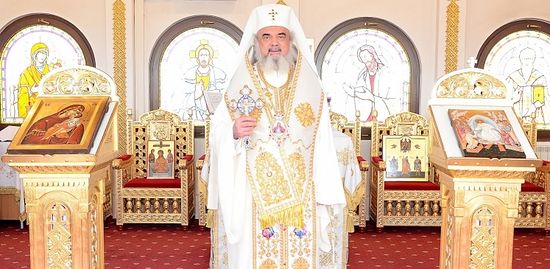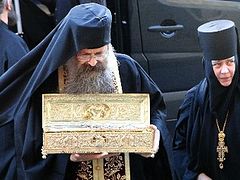Source: Basilica News Agency
October 18, 2015
The Patriarch of Romania underlined in his sermon that in the Gospel for the 20th Sunday after Pentecost (Luke 7:11-16) we see the mercy of God for distressed people and for those who died.
Christ our Savior alleviates the sorrow and sadness of mourning people
His Beatitude showed that Christ our Savior came to the city of Nain out of His own will, with merciful love for those grieving the death of their loved ones:
Jesus Christ our Savior came to the city of Nain to alleviate, console, and diminish the sorrow of this mourning mother, because He feels pity for all those who suffer, grieve, and mourn. At the same time, Christ our Lord wants to give life to the young man who left this earthly life too soon. We do not know the name of the widow’s son because the Gospel does not say anything about his name or of his mother. It means that the mourning woman, namely the grieved mother who was taking her only son to the cemetery, represents all the mourning mothers, and the dead young man carried to the cemetery represents all the young people who die and leave behind much sorrow to the parents who gave birth to them and reared them. Jesus Christ our Lord performs a miracle by bringing the young man of Nain back to life, showing in this way His merciful and humble love, namely a love which suffers together with those who suffer. This merciful love is called compassion, namely common suffering with those who suffer because of the soul’s sorrow.
To console a grieved family is a sign of a kind heart
“Therefore, we learn from the attitude of Jesus Christ that we ought to be near to all mourning people who cry for their lost ones,” the Patriarch of Romania said underlining that “we show, through our presence near to the grieving that the merciful love of Christ our Savior works through us.”
To comfort or console a grieving person or family is a very precious spiritual help and sign of much kindness of the heart, a proof of merciful love for a fellow human being. Saint Paul the Apostle urges us, in this regard, saying: “Rejoice with those who rejoice; mourn with those who mourn.” Therefore, today’s Gospel text calls us to comfort the parents grieved or in mourning who cry for their children who died either from a disease, an accident, or any other cause. We must be near those who are grieving, the same as Jesus Christ was present to the widow of Nain. Thus, we show that the merciful love of Christ works in us and through us, in our souls and through our presence with those who cry for their dearly departed,
His Beatitude Patriarch Daniel said.
The body of a Christian has become the “temple of the Holy Spirit” through baptism and through communion with the Body and Blood of Christ in the Holy Eucharist
Patriarch Daniel also demonstrated that the body of the dead must be looked after with respect:
Jesus touched the bier of the dead man also to teach us that we must come close to the bier or grave of the deceased with respect, because this body is called to resurrection and eternal life, as is stated in the Orthodox Creed: “I look for the resurrection of the dead and the life of the world to come.” But respect for the coffin and grave of the body of the deceased Christian must be greater because, through baptism and communion with the Body and Blood of Christ in the Holy Eucharist, the body of the Christian has become the “temple of the Holy Spirit.”
The relics of the saints are honored or venerated for the deifying work of the grace of the Holy Spirit in them and through them
His Beatitude has also taught that the relics of the saints must be venerated “because the holiness of the saint’s soul entered into the matter of his body too, which is the epiphany of his soul, active in all his deeds done on earth:”
When the holiness of the life of a Christian who has fallen asleep into the Lord is officially recognized by the Church, his bones are called “holy relics” and they must be venerated or honored together with his icon, because the holiness of the saint’s soul entered also into the matter of his body, which is the epiphany of his soul active in all his deeds done on the earth, among people. The relics of the saints who have fallen asleep into the Lord are honored or venerated not for their matter, but for the deifying work of the grace of the Holy Spirit in them and through them, according to the truth the psalmist expressed in the words: “You, God, are awesome in your saints.” It is only the grace of the Holy Spirit present in the relics of the saint that gives them healing and deifying power, as they are in a mystical relationship full of grace with their soul united with God, One holy, spring of eternal life.




